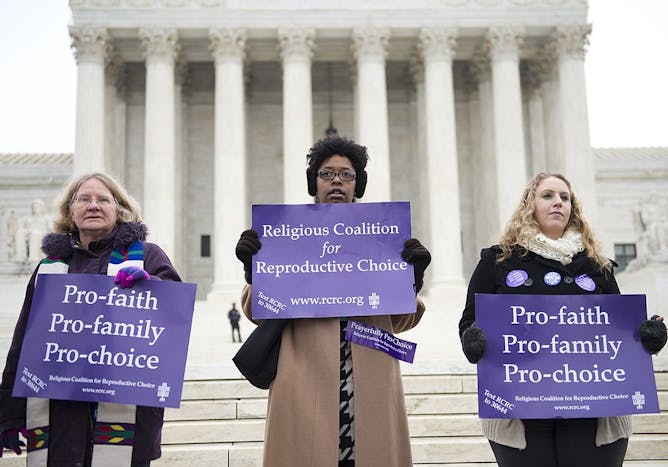|
Atheists versus religious fundamentalists. That's the main stereotype of the abortion debate in the U.S. today: as though there are two stark camps, pro-choice and pro-life; one opposed to God, one fighting for him.
In reality, of course, people’s views on whether abortion should be legal are far more complex, and so is religion’s role in the conversation. There’s no single “religious position” on the issue, whether you’re talking about among faiths or within them – and plenty of reproductive rights activists draw conviction from their traditions.
Samira Mehta, a scholar of gender, religion and sexuality at the University of Colorado Boulder, unpacks the diverse ways a number of different religious traditions think about abortion – emphasizing that when it comes to how people live out their faith, leaders’ official stance is just one part of the story.
Also today:
|

Demonstrators stand outside the Supreme Court in 2014.
Saul Loeb/AFP via Getty Images
Samira Mehta, University of Colorado Boulder
Views on abortion differ not only among major religious traditions, but within each one.
|
Economy + Business
|
-
John Logan, San Francisco State University
Starbucks Workers United has already organized 146 locations in about six months. While that’s a fraction of Starbucks’ 9,000 US stores, it’s one of the most successful labor campaigns in decades.
-
Veronika Dolar, SUNY Old Westbury
A bigger-than-expected jump in inflation means the Fed may have to get more aggressive about interest rate hikes. An obscure economic indicator suggests it has room to do so.
|
|
Education
|
-
Mary P. Koss, University of Arizona
An increasing number of college students say they were victims or perpetrators of sexual assault – and that victims were drunk when the assault took place. Are campus drinking environments to blame?
|
|
Environment + Energy
|
-
Brian Stewart, Wesleyan University; Gary W. Yohe, Wesleyan University
This technology, popular when automobiles first caught on, had a short resurgence in the 1970s.
|
|
Ethics + Religion
|
-
Ahmet T. Kuru, San Diego State University
A scholar of Islam writes about how widespread authoritarianism in the Muslim world shapes governments’ foreign policy toward Muslim minorities abroad.
|
|
Health + Medicine
|
-
Mark C. Bicket, University of Michigan; Jennifer Waljee, University of Michigan; Paul Edward Hilliard, University of Michigan
Non-opioid directives allow patients to refuse opioids in all health care settings. For surgical procedures that require anesthesia, however, this may do more harm than good.
|
|
Politics + Society
|
-
Ernesto Castañeda, American University
A sociologist shares what his research has taught him about migration.
|
|